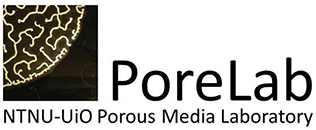
Peyman Mianji is visiting PoreLab Trondheim from Ruhr-Universität Bochum, Germany working with Dr. Ali Ghoreishian. He will briefly present us his PhD research during the coffee morning on Friday 11th March, at 10:00 (Trondheim time).
Title: The impact of bentonite-slurry-infiltration on the hydro-mechanical parameters of granular soil in the context of hydroshield tunnelling
Abstract: Slurry shield tunneling is a well-established technique in mechanized tunneling. Hereby, the tunnel face is supported by bentonite slurry, pressurized through the excavation chamber. Bentonite slurry is a mixture of water and bentonite powder, and often additives, i.e., polymeric or mineralic. When it comes to the soil-slurry interactions, three main mechanisms are observed: (I) external filter cake formation: where the bentonite particles are filtrated and accumulated at the soil surface and created a thin layer of relatively impermeable membrane; (II) pure penetration of slurry: where the slurry penetrated into the soil medium without any particle separation; (III)combined penetration and filter cake formation: both particle separation and slurry penetration are observed, the former one occurs where pores are small enough to trap the bentonite particles and latter one due to the presence of bigger pores.

In my presentation, I am going to explain the effectiveness of each mechanism on the stability of the tunnel face. Moreover, I will present some selected experimental results to discuss the impact of the slurry penetration/infiltration on mechanical and hydraulic properties of the slurry-infiltrated sand. Lastly, I will discuss the approach we chose to numerically model these penetration/infiltration processes.
